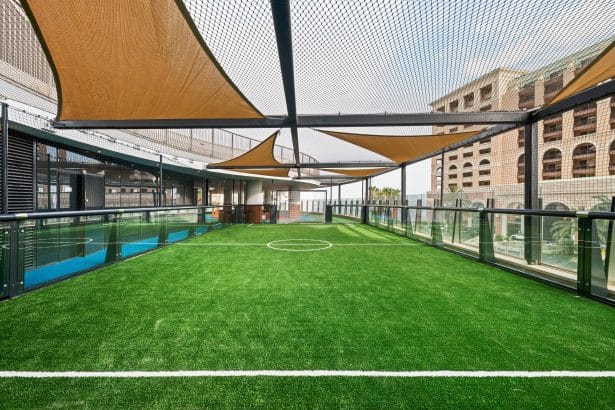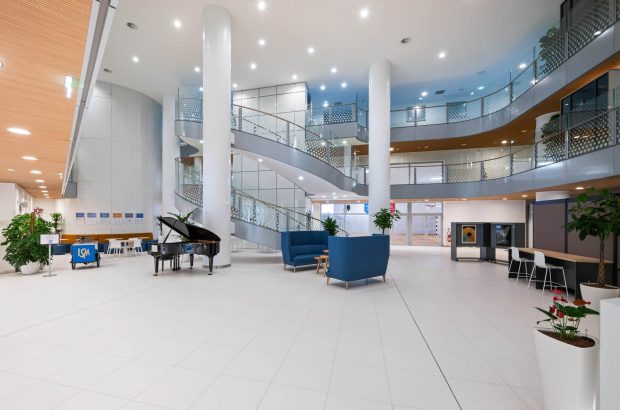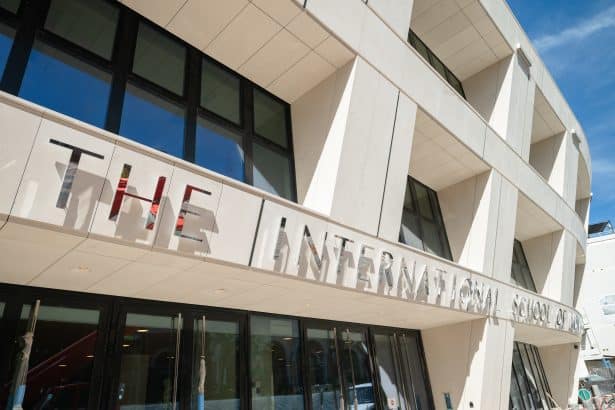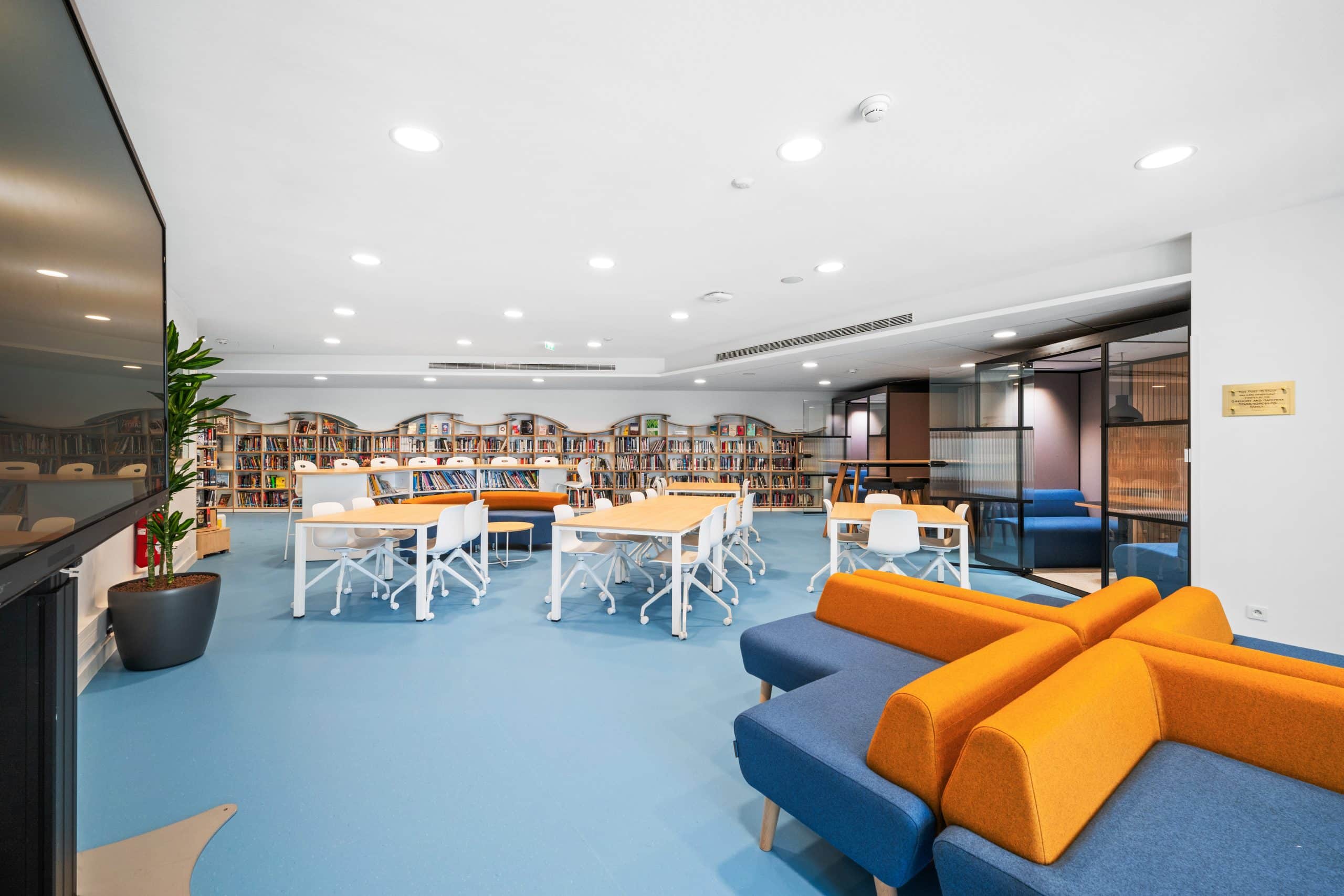Admissions
What is the admission timeline?
For the school year starting in September: all applications received before January 31st will be considered together. This does not, however, guarantee an offer of a place.
Applications received from February 1st onwards will be considered on a rolling basis subject to availability.
Applications received after April 30th will be considered LATE APPLICATIONS and may not be fully processed by the start of the new academic year, especially if entrance tests and interviews need to be scheduled.
The final decision on acceptance is determined by the Director and is based on advice from the Heads of Schools. The school reserves the right to decline a student, and it has no obligation to justify its decision.
Is it possible to visit the school?
We are thrilled to have started the 2024-2025 academic year in our brand-new school premises in Testimonio II (43 avenue Princess Grace, 98000 Monaco). For an exclusive sneak peak of our new school, please click here. We also invite you to listen to some of our students’ impressions of the new ISM facilities here.
For all inquires regarding an in-person school visit, please contact our Admissions team (admissions@ismonaco.com).
Does my child have to be toilet-trained to start kindergarten?
In order to be able to join our Kindergarten Afternoon (K PM) or Kindergarten Morning (K AM) class, your child must be properly toilet-trained. This involves your child having the necessary control and to be able to recognise when he or she needs to go to the bathroom. Your child must also not need any naps, as the school does not have the facilities for children to take naps.
At what age can my child begin to attend ISM?
For our youngest students, our Kindergarten Afternoon (K PM) class is for 3-4 years old. To qualify for this class, a child must be 3 years old on or before September 1st of the current academic year. For more information on ages and grade placement, please read the Grade Equivalents information in the following question.
Into which class will my child be placed?
Entry to a class is based on the child’s age on September 1st in the year of entry, taking into account previous class placement, school reports and by evaluation.
Only in exceptional circumstances will a child be placed in the year above or below his or her chronological age group. Small class sizes and differentiated teaching mean that your child’s needs can best be met in the correct class/age group.
- Primary School – K PM to Year 3: age 2½ to 6
- Primary School – Year 4 to Year 6: age 7 to 10
- Secondary School: age 11 to 18
Does my child have to speak English?
Primary School
Kindergarten to Year 6 (3 – 10 years old): Admission is open to students who demonstrate the ability to access and benefit from a challenging international bilingual programme (English and French) in a mainstream environment.
From Year 1 onwards, priority will be given to students whose level of English or French enables them to successfully access the bilingual programme.
Secondary School
Year 7 to 11 (11 – 15 years old): Admission is open to students who demonstrate the ability to access and benefit from a challenging international English language programme in a mainstream environment, which leads to IGCSE and IB Diploma examinations.
What is the entrance test?
Transition to Class 3
At our school, we embrace students from diverse social, ethnic, and cultural backgrounds who can both benefit from our educational offerings and enrich the broader school community. In accordance with our admission policy, we invite all applicants for Transition to Class 3 to participate in an in-class group assessment.
Please note that the in-class assessment is an integral component of the admissions process for children up to Class 3, and no final decision can be made if the application file is incomplete or if testing is pending. Parental attendance is not required during the group assessment session.
The admission process involves our staff observing your child during learning engagements and activities to assess their suitability for our rigorous bilingual curriculum. For students looking to join Classes 2 and 3, there will be a standardised assessment designed to evaluate their potential, rather than specific subject knowledge. These tests cover areas such as verbal, non-verbal, quantitative, and spatial reasoning. It’s important to note that there’s no need for special preparation, but families interested in familiarising themselves with the test can watch this video.
Class 4 to Class 12
Students applying for Class 4 to Class 12 must take the Cambridge CEM entry test, which is a standardised assessment designed to evaluate their potential, rather than specific subject knowledge. The test covers areas such as verbal, non-verbal, quantitative and spatial reasoning. It is important to note that there is no need for special preparation, but families interested in familiarising themselves with the test can visit this page.
The entry test lasts one hour and must be taken by your child in person at our school on a weekday of your choice between 8am and 5pm or on one of the specified Saturdays available.
Does ISM provide support for learning needs?
The school has limited provision for students with special learning needs and is only able to admit those with mild learning difficulties who demonstrate the ability to access and benefit from the regular curriculum and programme with short-term assistance from the Learning Support Department.
How does ISM compare to other schools?
The best way for you to make that judgment is to see for yourself what our school offers. In addition to the extensive information provided on our website, we also publish regular updates on our social media. If you would like additional information about the school, please contact us at admissions@ismonaco.com.
Of course, we think that ISM is very special. Our academic results are excellent: we regularly achieve around a 99% success rate in the International Baccalaureate, compared to a worldwide average of 84%. However, exam results are only part of the picture. ISM students are well-rounded young people who care about the world they live in and are ready to make their contribution.
Do we have to live in Monaco to apply to ISM?
No, you do not have to be a Monaco resident.
Life at ISM
What are the school hours?
The school week operates from Monday to Friday.
- Primary School, Kindergarten to Year 3:
08h30 to 15h15, except Kindergarten 08h45 to 12h00.
All students finish at 12h00 on Wednesdays.
- Primary School, Year 4 to 6:
08h30 to 15h30
All students finish at 12h30 on Wednesdays.
- Secondary School, Year 7 to 9:
08h15 – 16h00
All students finish at 13h00 on Wednesdays.
- Secondary School, Year 10 to 13:
08h15 – 16h00
All students finish at 15h00 on Wednesdays.
Is there a school bus service?
A school bus service is operational from the 1st start day of the local Monaco schools (early September). This is a dedicated public bus that collects our students from designated bus stops and delivers them to ISM.
Do you have boarding facilities or host families?
There are no boarding facilities and we do not arrange for students to live with host families. The IB Diploma programme in particular is very rigorous, and students need the support of their parents or legal guardians at home.
Is lunch provided?
For students from Transition to Year 10, an excellent self-service cafeteria provides a hot lunch every day except Wednesday. The cost is included in the tuition fees.
Students in Years 11, 12 and 13 usually go out for lunch.
Is there a school uniform?
Yes, we have a school uniform. The school uniform can be purchased directly from Chat Malo. Please refer to our uniform guidelines here.
Our children are currently in a school system that is very different from ISM. How will you know what level of work they are capable of?
Before offering a place at ISM, the Head of Admissions, Director and teachers look very carefully at the applicant’s school reports and other documentation that our Admissions Office asks you for. All applicants for Year 3 and above will be invited to come in for testing which is a diagnostic assessment designed to help students and their teachers understand how they learn and what their academic potential might be. It assesses how students think in areas that are known to make a difference to learning. An informal evaluation will also be offered to younger children.
Which external examinations and tests are offered at ISM?
At ISM, the International Baccalaureate Diploma and the International Baccalaureate Career-related Diploma examinations are offered at the end of Year 13, following a two-year programme of study. Our IB Diploma results are published each year.
ISM is also an authorised examination centre for the Associated Board of the Royal Schools of Music (ABRSM) and London Academy of Music and Dramatic Art (LAMDA) for external exams in music, singing, and drama.
What extracurricular activities do you offer?
We offer an extensive extracurricular programme that includes creative arts, athletics, Model United Nations, music, student newsletter, choir, language clubs, chess, the Duke of Edinburgh’s International Award, drama productions and much more!
Is there a Parent Teacher Association (PTA)?
Yes, our PTA is very active at ISM. Parents play vital roles, participating in our many PTA events and fundraisers throughout the year and adding to the life of the school.
All parents at ISM are automatically members of the PTA and are welcome to attend the monthly meetings.
The PTA Committee is made up of one parent representative per class who serves as a point of contact for the parents and represents the class at all PTA meetings. The class representative is also involved in helping with all PTA activities such as Christmas crafts, the Summer Fête, class parties etc.
The PTA is always in need of volunteers, and all parents are encouraged to participate in any way they can. For new parents, the first opportunity to find out more about the PTA is to attend our monthly PTA meeting. Please do not hesitate to contact pta@ismonaco.com if you are interested in joining!
Do you provide distance learning possibilities?
Our school is not a distance learning school. However, due to our Athlete-Friendly Education Centre (AFEC) accreditation from the World Academy of Sport, we do offer additional flexibility and support such as distance learning options and adapted timetables for our recognised student-athletes, in order for them to combine their academic workload with their sporting schedules. To find out more about our AFEC accreditation and the benefits we provide for student-athletes, please refer to our Accreditations page.
I already have a child at ISM, do I have priority?
Yes, we try to give priority to siblings. However, there is no guarantee that a place will be available.
What is your policy concerning absence / attendance?
Regular attendance is one of the most important factors determining success or failure at school. Absences are disruptive and detrimental not only to the student concerned but also to the rest of the class and the professional efforts of the teacher. There is a close correlation between good attendance and good academic performance. Please read our Attendance Policy below.
Can my child bring his/her mobile phone?
Our ultimate goal is to help young people become responsible users of technology. ISM is on this journey, but it is clear that phones should not be a distraction to learning. The expectations with regards to phones this year are as follows:
- Year 7 – 10: phones will be handed into Homeroom Teachers at the start of the day and collected at 16.00
- Year 11 – 13: phones will be placed in a marked box at the front of the classroom at the start of each lesson.
Phones should not be used or seen in the corridors and communal areas of the school.
Do students have homework?
What technology do you use in the classroom?
At ISM, we use Google Workspace for Education Fundamentals, as it allows us to move beyond the traditional paradigms of education and thus create a rich, dynamic and high-quality learning environment. Teachers and learners can work anytime and anywhere using a powerful set of tools that allow instant feedback and the tracking of progress to support personalised learning.
“We use technology in a balanced way to support, challenge, personalise and extend learning.”
How do you deal with wellbeing at ISM?
The wellbeing of our students is of utmost importance to us all at ISM, and this is evidenced by the fact that our school day is constructed around our four values: integrity, learning, caring and respect. Wellbeing is not only taught discretely through our assembly programmes but it is also an integral part of everyday life at ISM – from the classroom, to the playground, to the cafeteria and elsewhere.
Student wellbeing encompasses the areas of physical, mental and emotional health. Healthy minds and bodies result in happier, more resilient children who benefit from a real opportunity to flourish in a supportive academic setting and consequently achieve their goals.
The wellbeing of our children is a team effort – together with you, the parents, we strive to resolve issues before they develop and to help students become more independent in managing their academic work and their social skills. Student wellbeing is indeed at the heart of everything we do at ISM. For more information on wellbeing at ISM, please visit the Wellbeing section of our website.








